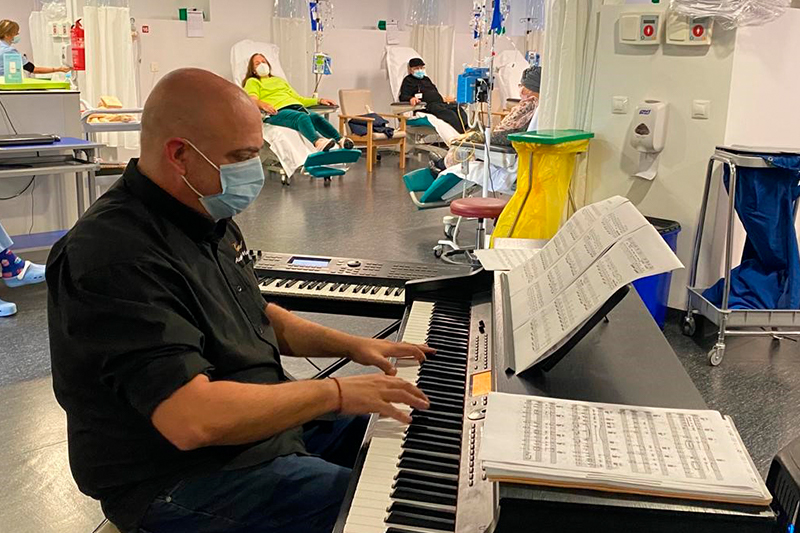- Music therapy, micro-concerts, prenatal singing, music libraries, collaborations with health musicians and a channel with song lists adapted to groups of patients are some of the actions promoted by the health group in its hospitals and which are included in the Rhythms of Life programme.
- Various specialists claim that music therapy can reduce blood pressure and heart rate and have a direct effect on stress and anxiety, as well as influencing cognitive and emotional levels.
- During 2023, the Rhythms of Life programme focused on outreach for the prevention of cardiovascular disease with the construction of the first ever arrhythmic metronome.
The Ribera healthcare group is giving new impetus to music therapy and the different actions that unite music and health in its hospitals, to improve the well-being of its patients and contribute positively to their recovery. Workshops, micro-concerts, prenatal singing, music games and a Spotify channel with different playlists are some of the activities that are now grouped together in the Ritmos de Vida group’s macro-programme.
Ritmos de Vida was born a year ago as a project to raise awareness of the importance of heart health by linking the tempo of music to the rhythm of heartbeats and building the first ever arrhythmic metronome. This campaign, carried out with the help of the creative agency Maart, has been displayed in the group’s main hospitals, which have also organised conferences and talks to help patients prevent cardiovascular risks, as well as music therapy workshops and live performances.
All the initiatives organised by Ribera that link music and health are now part of the Rhythms of Life macro-programme, and the group’s objective is to progressively incorporate all the new actions in this line. “More and more scientific studies are linking music to wellbeing and quality of life,” explains Ribera Polusa hospital psychologist Belén Vázquez, who assures us that “it is a good therapeutic tool, which is becoming increasingly important in clinical practice, affecting the physical, cognitive, emotional, social and behavioural components”.
Dr. Alex García, head of Neurology at Denia Hospital, assures that music therapy “has a controlled influence, among other things, on motor skills, memory, attention, creativity, verbalisation, strengthening of the senses, proprioception, reduction of stress and anxiety, brain stimulation, the immune system and biological rhythms”. Hence, as the Ribera Polusa psychologist recalls, it has very beneficial effects on sleep disorders, anxiety, depression, personality disorders or phobias of different types. Micro-concerts organised in areas such as dialysis, oncology day hospital or the ICU have been very well received by patients and their benefits have been demonstrated.
Christelle García, psychologist at the Vinalopó University Hospital, says that “some clinical studies show that music therapy can be used as an alternative therapy in the treatment of depression, autism, schizophrenia and dementia, as well as for problems of agitation and substance abuse, with benefits in the field of social isolation, cognitive sphere and psychotic symptoms”. He also explains that “in patients admitted to the ICU, music therapy can help them by reducing heart rate, respiratory rate and blood pressure, which facilitates a relaxation response”. In the ICU of the Hospital Universitario de Torrejón, music is “a non-pharmacological tool to improve the physical and emotional well-being of patients and their relatives”, as the supervisor of this unit, Conchi Faura, explains. “Music therapy has been shown to reduce stress and anxiety in patients, creating a positive atmosphere during their stay in a complicated space,” she adds.
In addition, music therapy and prenatal singing workshops have been introduced in the group’s hospitals to help pregnant women relax. With paediatric patients, music also has a “calming” effect. Hospitals such as the university hospitals of Vinalopó and Torrejón, Denia, Ribera Povisa, Ribera Polusa or Ribera Hospital de Molina have already demonstrated how well they are received by patients. A patient recently wrote about an experience with music therapy at Torrejón Hospital: “Both my father, who was admitted to the ICU, and we burst into tears when we heard you, and the emotion was at its peak when we saw my father moved, remembering childhood experiences thanks to your beautiful melodies and voices. Music therapy should be a compulsory treatment”.
In order to disseminate the benefits of music in the field of health to the general public, as well as to patients and professionals themselves, the Ribera Group has recently launched a Spotify channel with personalised music playlists for different groups of patients and professionals.


Recent Comments